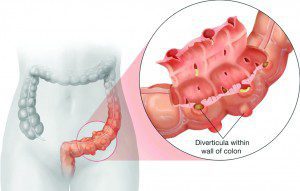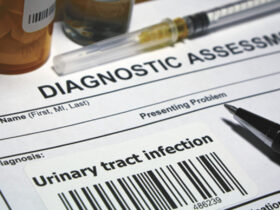By Manuel F. Bustamante, MD – Gastroenterology Specialists
 Diverticulitis is a common intestinal disease that affects many adults, most of whom are not even aware that they have it until serious symptoms appear. Most often it is found in middle-aged men, but it can affect anyone at any age.
Diverticulitis is a common intestinal disease that affects many adults, most of whom are not even aware that they have it until serious symptoms appear. Most often it is found in middle-aged men, but it can affect anyone at any age.
This condition occurs when an abnormal pouch forms in the intestinal tract. When the diverticula in your intestines, which are also called polyps, become filled with digested or partially digested food that gets stuck there and causes inflammation. If inflammation turns into infection, diverticulitis can be life-threatening. However, with early detection, the disease can be effectively controlled with a healthy, whole-foods diet.
It is difficult for patients to know if they are affected because prior to the onset of inflammation or infection, most never have any symptoms and simply are not aware that they have the condition. The polyps typically are found in the large intestine, but have been reported in the small intestine, stomach and esophagus as well. While the diverticula are inactive and not inflamed, you amy experience some symptoms that are common to many other conditions, making it difficult to know that something more serious could be wrong.
The onset of the condition usually manifests itself with mild to severe abdominal pain and cramps, nausea and moderate fever. The primary treatment option is absolute bed rest, with an accompanying regimen of antibiotics and strict observance of what you eat and drink. Generally, during in-home treatment, you will be restricted to a liquids-only diet along with the prescribed antibiotic regimen. After a few days, you will be advised to start on a high-fiber diet, avoiding the processed foods that were probably the cause of the disease in the first place.
Can certain foods help?
There are certain foods that can aid in the prevention or management of symptoms. Consuming whole-wheat breads and cereals, bran flakes, whole-wheat English muffins and beans such as black, navy and kidney varieties as well as unpeeled pears and apples can be beneficial in preventing and eliminating inflammation.
When it comes to vegetables, the most recommended foods are potatoes-sweet and regular-but unpeeled because most of the beneficial fiber is in the peel. Squash, peas, cauliflower, broccoli, spinach and turnip greens are also very beneficial.
Contrary to older information, you may also consume nutrient-rich berries with small seeds like strawberries and raspberries.
Dietary changes don’t work. Now what?
If careful diet modification do not resolve the problem and you continued to experience pain, bloating and gas, you may be suffering from a more severe form of diverticulitis, which could be life-threatening.
If the symptoms aren’t relieved and they remain severe, the intestines will likely become infected. When infection sets in, the the polyps are getting larger and the wall of your intestine is bulging with the matter accumulated therein. If the condition reaches this point, emergency surgery is generally performed to avoid the bursting of the infected area, which in turn would dump into your abdominal cavity, causing potentially fatal sepsis, similar to a ruptured appendix. Provided you are under medical supervision and your blood is monitored closely, surgical intervention will be performed well before the condition progresses to that point.
During regular surgery for the disease, an incision is made in your lower abdomen, the defective part of your colon is removed and the surgeon makes sure that there is absolutely no contamination in your abdomen before closing the wound.
Recovery time depends on the severity of the infection but can be from as few as two weeks to several months. During this time it is very important that your blood be closely monitored and you stick to a strict diet plan that is given to you by your health care team.
If you are suffering from the symptoms of diverticulitis or if you think that you may have it, you should see a doctor immediately. Complications can arise, such as a tear within the colon, which can put your life in danger. To prevent your chances of developing diverticulitis, you should be sure to consume a diet that is rich in fiber. Also, drink plenty of water and see your doctor as soon as you fear that there may be something wrong. The earlier you address the issue, the more likely it is that you will not need surgery.
For more infromation about diverticulitis and would like to schedule an appointment to meet with one of our physicians, please contact our office at (239) 593-6201 or send an email with the subject “Diverticulitis” to gastro@gispswfl.com.









